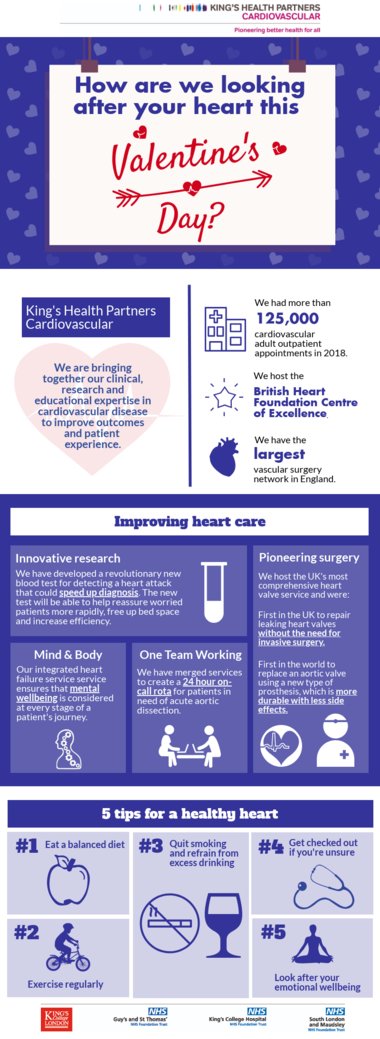14 February 2019
This Valentine’s Day we take a look at some of the ways that King's Health Partners Cardiovascular is bringing together clinical, research and educational expertise to deliver world-class heart care.
Roses are red, violets are blue, read our healthy heart tips, as our Valentine’s Day gift to you!
Three ways we’re mending broken hearts
1. Integrated heart failure service
It is estimated that 9,000 people are living with heart failure in Southwark and Lambeth but less than 3,000 are known to healthcare services.
To meet this need, King's Health Partners Integrated Heart Failure Service is working to help people with heart failure live longer and with a better quality of life in their own homes. The service brings together staff from Guy’s and St Thomas’, King’s College Hospital and South London and Maudsley NHS Foundation Trusts into one team.
In addition to providing educational materials for staff in primary care and establishing connections with community teams – the service ensures that mental wellbeing is considered at every stage of a patient's journey. Last year the team referred more than 250 patients for psychological support.
2. Merged on-call services
Surgeons at Guy’s and St Thomas’ and King’s College Hospital NHS Foundation Trusts have merged on-call services to create a 24-hour rota for patients in need of acute aortic dissection. An aortic dissection is a serious condition in which the inner layer of the aorta, the large blood vessel branching off the heart, tears. The condition can be fatal if not detected and treated early.
The joint rota reduced waiting times for patients in need of surgery and improved patient survival rates from 52% to 75%. It was also showcased in the Getting It Right First Time report as an example of ‘good practice’.
3. Pioneering surgery
Guy’s and St Thomas’ NHS Foundation Trust was the first in the UK to perform an innovative heart procedure which repairs leaking heart valves without the need for invasive surgery. This pioneering technique uses equipment known as an Arto device, to pull a stitch across a leaking mitral valve and then tightens it to stop the leak.
King’s College Hospital NHS Foundation Trust carried out the world’s first aortic valve replacement using a special type of prosthesis. Usually a metal mechanical valve is used but patients need to take life-long warfarin to thin their blood due to risk of clots forming in the valve. However, the new type of valve does not require blood thinning medication and is therefore much more durable.
Red hot research
Scientists at King’s College London have developed a revolutionary new blood test for detecting a heart attack that could speed up diagnosis and save the NHS millions of pounds.
It is estimated that more than two thirds of people who attend A&E complaining of chest pain have not had a heart attack. However current tests can take considerable time to confirm whether the pain is caused by heart failure. The new test will be able to help reassure worried patients more rapidly, free up bed space, and save money.
Want to brush up on your cardiovascular skills?
Take part in the Anticoagulants and atrial fibrillation e-learning on the King’s Health Partners Learning Hub – free to staff. Just log in with your trust or university account.
Anticoagulants are commonly prescribed to help prevent blood clots. This resource includes a set of films which provides information about how anticoagulants work and how to answer patients’ common questions about them. Enrol
Five tips for a healthy heart
We asked Professor Ajay Shah, British Heart Foundation Professor of Cardiology at King’s College London and Chair of Cardiology at King’s College Hospital NHS Foundation Trust, to give us his top five tips for maintaining a healthy heart.
-
Eat a balanced diet
Being overweight increases your blood pressure and cholesterol levels. The British Heart Foundation recommends having plenty of fruit and vegetables, wholegrain starchy foods, a smaller amount of milk, dairy products and meat and a very small amount of foods which are high in sugar and fats.
2. Exercise regularly
Staying active can help you control your weight, reduce your blood pressure and cholesterol, and improve your mental health. The NHS recommends 150 minutes of exercise per week. Research shows you can reduce your risk of heart and circulatory disease by 35% by being more physically active.
3. Don’t smoke and refrain from excess drinking
Smokers are almost twice as likely to have a heart attack compared to non-smokers. Quitting smoking dramatically reduces your risk of coronary heart disease, stroke and a variety of cancers. Drinking more than the recommended amount (14 units per week) of alcohol can also have a harmful effect on your heart – reducing your alcohol intake will improve your blood pressure and help you maintain a healthy weight.
4. Get checked out if you’re unsure
If you have a family history of cardiovascular disease you may have an increased risk of developing cardiovascular diseases such as coronary heart disease, angina, heart attack, heart failure and stroke. Make sure you tell your doctor or nurse so they can check your blood pressure and cholesterol. You should also have a check up after the age of 40 to ensure you are not at risk.
5. Look after your emotional wellbeing
We know that there is an inextricable link between our mental and physical health, so it is unsurprising to learn that stress can play a role in developing heart disease. From leading you to turn to unhealthy habits, such as overeating and smoking to having heart palpitations, continued stress is detrimental to your overall health, including your heart. So, smile more and be happy!
You can find out many more tips and advice about maintaining a healthy heart on the British Heart Foundation website.





